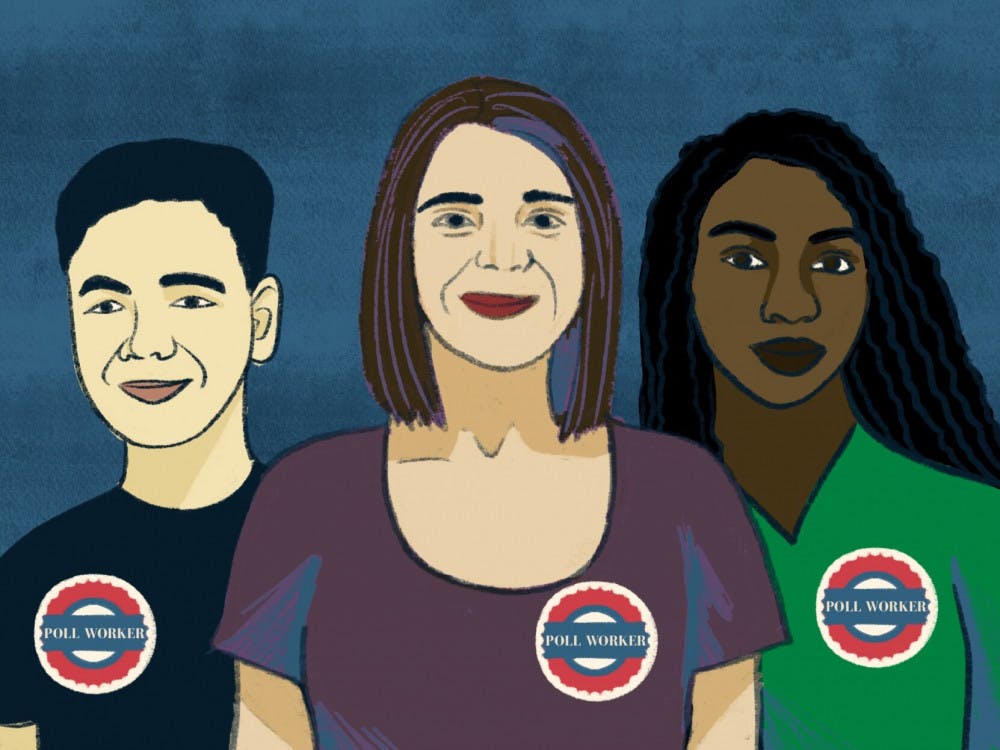
After noticing the overwhelming number of poll workers at risk of having health complications associated with COVID-19 due to their age, Diarmuid Swan decided to give it a try.
“It was the pandemic that really led me to consider doing it,” Swan said.
Swan, a 24-year-old UF political science junior, is one of about 2,000 people who applied this year to be poll workers in Alachua County for the coming general election Nov. 3. Swan, who first voted in 2016, said he believes people need to do more than just vote in elections to make a difference in the U.S.
Alachua County Supervisor of Elections spokesperson TJ Pyche said the number of college-age students interested in being poll workers has considerably increased compared to previous years.
Poll workers on Election Day are paid between $150 to $280 based on their positions, including being a clerk, who looks over most tasks; and voting machine operators, who greet voters, check IDs and verify and update voter information. Due to COVID-19, there will be designated poll workers tasked with sanitizing electronic pens and cleaning voting areas throughout the day, Pyche said.
Workers receive their payment in the form of a check about four weeks after Election Day, Pyche said.
Swan will be paid $180 for operating a voting machine, but said the money was not a factor in his decision. He said he wants to have firsthand knowledge of how elections work and possible flaws that might exist.
Poll workers are required to be at their assigned location from 5:45 a.m. until about an hour after 7 p.m., once the location has closed.
Swan was assigned at the 25th precinct, Santa Fe College’s Charles L. Blount Center in downtown Gainesville. Pyche said each location will have between seven and 10 workers.
Swan said the poll worker application process was easy and completely online. Once approved, he attended a five-hour training session at the SOE building to learn how to operate the voting machines.
About 10 other prospective poll workers attended the training session with him and practiced social distancing at all times, he said.
On Election Day, every poll worker is required to remain non-partisan in their appearance. They are not allowed to wear political attire or speak in any way that suggests their candidate preference, Pyche said.
Pyche said all election workers are required to wear masks and all polling locations will allow for social distancing. Voters are encouraged to wear masks. Maskless voters will be offered a face covering, but will be allowed to vote if they decline.
Swan said he is planning to stay by making sure he doesn't hold voters’ IDs and constantly cleaning the electronic pens voters use to sign.
“It's really gonna be on our end to protect ourselves and not really on the voters,” Swan said.
He said that although people are voting by mail due to COVID-19, he still expects to see long lines and many people voting in person because they do not trust USPS to deliver their ballots.
Despite the training he received, he is more worried about making a mistake while using the voting machines than contracting COVID-19.
For the primary elections on Aug. 18, Alachua County had a shortage in poll workers. However, for this coming election, the SOE has received about 2,000 applications and only about 600 have been accepted. The rest are on stand-by, Pyche said.
Prior to the COVID-19 pandemic, he estimated about 80% of election workers and applicants were over the age of 60. Now, he said, it is about 50%.
“Anecdotally, it used to be once in a blue moon when we would see a young person — somebody perhaps under 25 — apply for one of these positions or apply to be an election worker,” Pyche said.

Aurora Martínez is a journalism senior and the digital managing editor for The Alligator. When life gives her a break, she loves doing jigsaw puzzles, reading Modern Love stories and spending quality time with friends.




